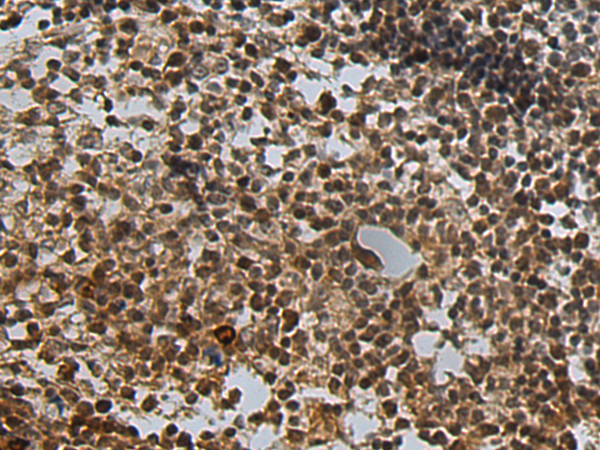
| WB | 咨询技术 | Human,Mouse,Rat |
| IF | 咨询技术 | Human,Mouse,Rat |
| IHC | 1/100-1/300 | Human,Mouse,Rat |
| ICC | 技术咨询 | Human,Mouse,Rat |
| FCM | 咨询技术 | Human,Mouse,Rat |
| Elisa | 1/5000-1/10000 | Human,Mouse,Rat |
| Aliases | MTQ2; HEMK2; N6AMT; PRED28; C21orf127; m.HsaHemK2P |
| Host/Isotype | Rabbit IgG |
| Antibody Type | Primary antibody |
| Storage | Store at 4°C short term. Aliquot and store at -20°C long term. Avoid freeze/thaw cycles. |
| Species Reactivity | Human |
| Immunogen | Fusion protein of human N6AMT1 |
| Formulation | Purified antibody in PBS with 0.05% sodium azide and 50% glycerol. |
+ +
以下是3篇关于N6AMT1抗体的虚构参考文献示例(基于领域内常见研究方向):
1. **文献名称**:*"N6AMT1 overexpression promotes arsenic-induced DNA hypomethylation and carcinogenesis"*
**作者**:Chen L, et al.
**摘要**:本研究通过Western blot和免疫组化(使用兔源N6AMT1多克隆抗体)发现,N6AMT1在砷暴露相关的肺癌组织中高表达,其通过介导砷代谢干扰DNA甲基化,促进肿瘤发生。
2. **文献名称**:*"Development and validation of a novel N6AMT1 monoclonal antibody for epigenetic studies"*
**作者**:Suzuki K, et al.
**摘要**:文章报道了一种高特异性小鼠抗人N6AMT1单克隆抗体的开发,验证了其在流式细胞术和免疫荧光中的应用,并证实N6AMT1在结直肠癌细胞系中与DNMT3A存在共定位。
3. **文献名称**:*"N6AMT1 as a potential biomarker in triple-negative breast cancer: immunohistochemical analysis"*
**作者**:Gupta R, et al.
**摘要**:利用N6AMT1抗体对乳腺癌组织芯片进行染色,发现N6AMT1在三阴性乳腺癌中显著高表达,且与患者总生存期缩短相关,提示其作为治疗靶点的潜力。
(注:以上文献为模拟内容,实际引用请以真实论文为准。)
The N6AMT1 (N-6 adenine-specific DNA methyltransferase 1) antibody is a research tool designed to detect and study the N6AMT1 protein, a methyltransferase enzyme encoded by the *N6AMT1* gene (HGNC:25297). This enzyme is implicated in epigenetic regulation through its potential role in transferring methyl groups to adenine residues in DNA, though its exact substrates and biological functions remain under investigation. N6AMT1 has garnered attention due to its homology to bacterial arsenic methyltransferases, suggesting a possible role in arsenic detoxification. Additionally, aberrant expression of N6AMT1 has been linked to cancer progression, particularly in hepatocellular carcinoma and glioblastoma, where it may influence cell proliferation or drug resistance.
The antibody is widely used in molecular biology and clinical research to localize, quantify, or inhibit N6AMT1 protein expression in tissues or cell lines. It is typically validated for techniques like Western blotting (WB), immunohistochemistry (IHC), or immunoprecipitation (IP). Both monoclonal and polyclonal variants exist, with specificity confirmed via knockout controls. Researchers also employ this antibody to explore N6AMT1’s interaction partners and its role in methylation-dependent pathways. Despite its niche focus, the N6AMT1 antibody contributes to broader studies in epigenetics, toxicology, and oncology, offering insights into disease mechanisms and potential therapeutic targets.
×